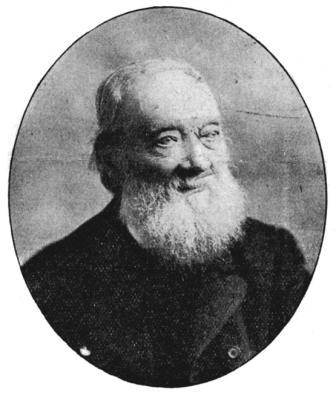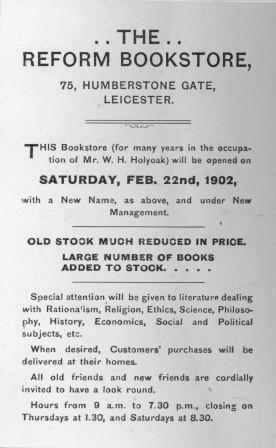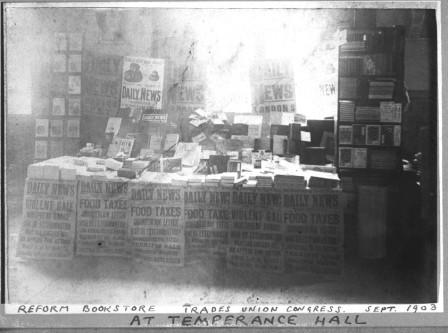William Henry Holyoak
(1818 - 1907)
The following is a biography of W. H. Holyoak published in Leicester Reasoner May 1902. Below that is a poem by him. The photos are from the Leicester Secular Society Archives which are kept at the Wigston Record Office. All of this information has been provided thanks to Ned Newitt. He reports that he found a duplicated copy of the poem in the copy of the 'Reasoner'.
William Henry Holyoak
Born: Sileby Jan 27, 1818, died: 1907
(Secularist and Bookseller)
For many years Leicester has known few figures more familiar than that of Mr. William Henry Holyoak. Last February, (1902) our veteran friend gave up business at the Secular Bookstore. For a very long period he had sold pioneer literature, and openly identified himself with Freethought views.
Mr. Holyoak was born at the village of Sileby, near Leicester, on January 27th, 1818, one year before the birth of Queen Victoria. Owing to the disturbance of trade, caused by the Luddite riots, his parents migrated to the little town of Chard, in Somersetshire, and dwelt there for some years.
Young William tried a variety of occupations before settling down as a tailor's apprentice; and he was a proud lad when, one day, he completed for his own use a magnificent claret-coloured waistcoat. His only schooling was received at Chard, but he supplemented these scanty lessons by a good deal of reading (such as the Penny Magazine, then very popular), and, what is better, by a good deal of thinking.
On the return of the family to Leicester, they frequented the Bond Street Chapel. But when William had the temerity to ask questions on theological subjects, and when the minister and deacon gave him unsatisfactory replies, he thought it time to go elsewhere for intellectual and moral guidance.
George Jacob Holyoake was becoming a prominent advocate of Freethought, and his visit to Leicester, just after his imprisonment in Gloucester Goal for so-called blasphemy, roused the liveliest interest among the young men with whom William was associated. They also owed a great deal to the influence of the venerable George Bown, a reformer whose memories went back to the days of the French Revolution and Thomas Paine.
For a period of some three months, Mr. Holyoak joined with several of his friends in a sort of vegetarian colony, at a house in Halford Street. From the year 1846 onwards, our friend continued tailoring and bookselling, and many thousands of the townspeople must have learned the rudiments of Rationalism through the publications which they purchased at his shop in Bond Street, or at 18 Belgrave Gate, or, still later, in Humberstone Gate. Excluding one year (when the late Mr. Thomas Slater was in charge) he presided at the Bookstore connected with the Secular Institute from 1881 to 1902.
Mr. Holyoak helped to form the Secular Society in 1852, and stuck manfully to it through all its ups and downs, taking part in its business and discussions, and occasionally reading papers at its meetings. He assisted in the movement which promoted Sunday music in the parks, and in the agitation for the Sunday opening of museums and picture, galleries. For more than half a century he has loyally helped to spread the gospel of liberal thinking and social progress. He offers a worthy example to our young people. He has done his honest part in the service of humanity, and deserves the rest which we hope he will long enjoy.
There is a similar short biography in Gould's 'History' of the Society and also a short poem. The Leicester Reasoner spells his name with an 'e' at the end, but most references to his name spell it without the 'e, so I have adjusted the above text accordingly. He was not related to G. J. Holyoake. There is a little joke in Sydney Gimson's 'Recollections' where someone compared him to a Druid, since he was sitting between two 'Holy Oaks'! [GPJ]
Poem by William Henry Holyoak
Let us lift up our voices in song
And rejoice in the freedom we've won
From the maze and the story
Of God and his glory
As taught by the priest to the young
The mists of life's morning have faded
And we see with a vision more clear
That a man need not wait
For a blessed estate
If he works with a will whilst he's here
There's no help in a Heaven above
‘Tis a fable, a guile and a snare
And he who would tell
Of the terrors of Hell
Is a cheat, so let him beware.
Of deceiving his Brothers for gain
For of all crimes this is the worst
And he that is found
Living on this said ground
Ought not to complain if he's cursed
Then we'll work and we'll strive to improve
The lot of each one of our band
For the life of today
Will be certain to pay
A reward for the work of our hand
Lets us all seek to aid one another
As onward we pass on life's way
No nobler plan
Can be told you by man
That will tend to make brighter the day
W. H. Holyoak, Saturday afternoon, December 2nd, 1876.
A copy in Holyoak's own handwriting is in our archive.
and the second a picture of a bookstall display at the Trades Union Congress 1903.















